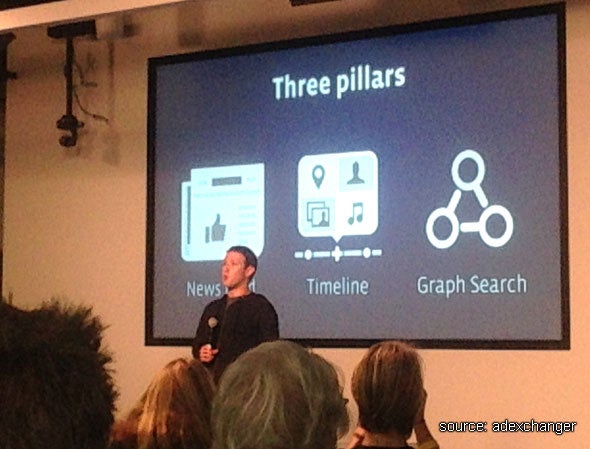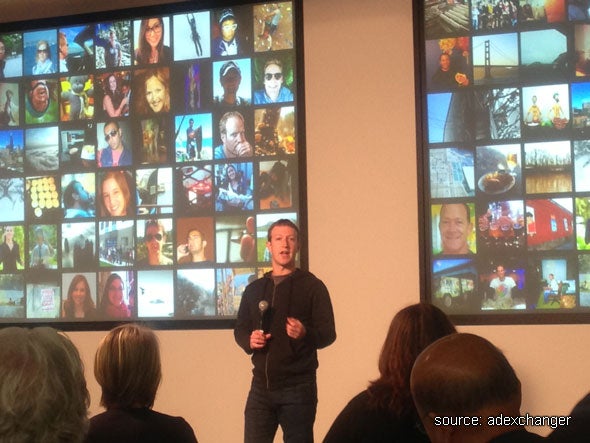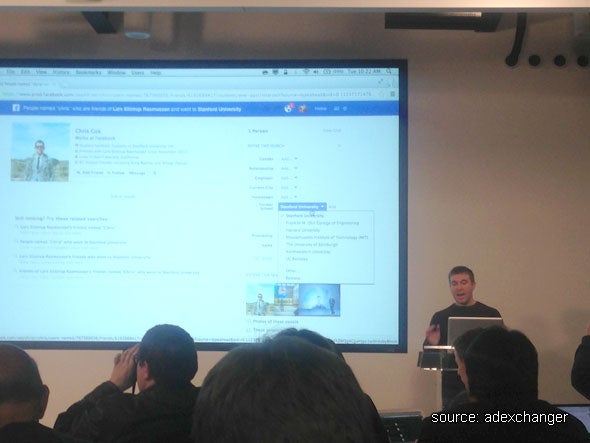 With the Beta launch of Graph Search today, Facebook aims to let users search through all their friends’ data in one place — rather than having to hop from profile to profile, page to page. CEO Mark Zuckerberg describes the initiative as a third pillar alongside its other core social products, Newsfeed and Timeline.
With the Beta launch of Graph Search today, Facebook aims to let users search through all their friends’ data in one place — rather than having to hop from profile to profile, page to page. CEO Mark Zuckerberg describes the initiative as a third pillar alongside its other core social products, Newsfeed and Timeline.
“Graph search is the kind of product we love to build at Facebook,” Zuckerberg said today during the announcement event at the company’s Menlo Park headquarters. “Since every piece of content has its own audience, we have created a way to access that.”
While there is no immediate impact to how ad space is organized or sold, Facebook said businesses should be aware of how crucial the information on their Pages is and that they are accurately tagged and organized so they show up in these new searches. And down the line, as the product enters general release, one can imagine a future where Facebook allows advertisers to leverage commercial intent expressed through their Graph Search queries to deliver more targeted ads.
Zuckerberg and the two former Google executives heading this new service (Tom Stocky and Lars Rasmussen) argued there is great potential for the social graph to benefit businesses and advertisers, but said the focus now is on the user experience.
With 1 billion people, more than 240 billion photos, and 1 trillion connections currently on the site, executives said it has taken Facebook more than a year to create the right search functionality and filtering system to work within the privacy settings on the platform.
The beta rollout will be “very slow,” Zuckerberg emphasized, and may only reach a few hundred or thousand people today. Engineers want to make sure they can map and learn from the early searches so that the product is well-tuned when it reaches all users.
Among the search features Facebook will support are the ability to query everything a user has liked, or all the best (and most liked) photos among friends. Facebook has teamed up with Microsoft to offer Bing as a back-up for queries that don’t garner Facebook results.
“It is not the intent of Facebook to have people going to us for web searches but it will allow them to get results they are looking for,” Zuckerberg said.
Zuckerberg also pointed out that Facebook was in early talks with Google about offering web searches in the new graph search, but he said that “talks fell apart” when it came to how flexible Google could be in allowing people to alter privacy as they search and edit their online profile appearances. However he did say he “would love to work with Google.”
On privacy, Facebook said it will educate users on what is public and what is hidden, and begin to display an information box at the top of the Newsfeed allowing users to take bulk actions and hide information as they see fit. But Stocky has hopes that businesses and users will see this as another benefit to social sharing and will be enticed to like more of their favorite restaurants, sporting teams, and destinations, with the hopes that their search results will be richer and more accurate.
Facebook also sent out information to businesses with pages to help them better understand how to be in optimal standing for the Graph Searches.
In addition to assuring that their pages are accurate and up-to-date, it is also key to attract the “right fans” to their page and give them reasons to interact on their page on an ongoing basis. “This ongoing interaction is key for Graph Searches since the system will rank results based on how many friends like a page, how often it has been commented on and other activity,” it said.



Read “Reaction: Ad Implications For Facebook’s Graph Search.”











